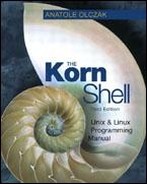Command Substitution
Command substitution is a feature that allows output to be expanded from a command. It can be used to assign the output of a command to a variable, or to imbed the output of a command within another command. The format for command substitution is:
$(command)
where command is executed and the output is substituted for the entire $(command) construct. For example, to print the current date in a friendly format:
$ echo The date is $(date) The date is Fri Jul 27 10:41:21 PST 1996
or see who is logged on:
$ echo $(who —q) are logged on now root anatole are logged on now
Any commands can be used inside $(...), including pipes, I/O operators, metacharacters (wildcards), and more. We can find out how many users are logged on by using the who and wc –l commands:
$ echo $(who | wc —l) users are logged on There are 3 users logged on
Bourne Shell Compatibility
For compatibility with the Bourne shell, the following format for command substitution can also be used:
`command`
Using `. . .` command substitution, we could get the names of the files in the current directory like this:
$ echo `ls` are in this directory NEWS asp bin pc are this directory
If you wanted a count of the files, a pipe to wc could be added:
$ echo There are `ls | wc —l` files here There are 4 files here
Directing File Input
There is also a special form of the $(...) command that is used to substitute the contents of a file. The format for file input substitution is:
$(<file)
This is equivalent to $(cat file) or `cat file`, except that it is faster, because an extra process does not have to be created to execute the cat command. A good use for this is assigning file contents to variables:
$ cat foo a b c $ X=$(<foo) $ echo $X a b c
We will talk about this later in Chapter 3.
Arithmetic Operations
Another form of the $(...) command is used to substitute the output of arithmetic expressions. The value of an arithmetic expression is returned when enclosed in double parentheses and preceded with a dollar sign.
$((arithmetic-expression))
Here are a few examples.
$ echo $((3+5)) 8 $ echo $((8192*16384%23)) 9
Performing arithmetic is discussed in detail in Chapter 6.
